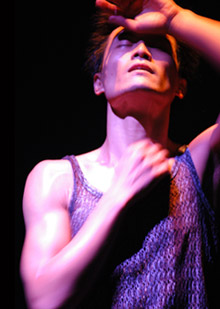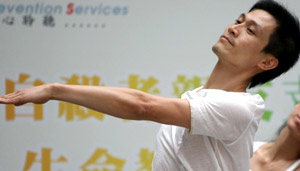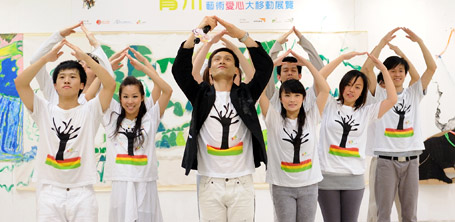World AIDS Day (WAD) is, as you’ll all know, marked every year on the 1st of December, and has been so since 140 Ministers of Health assembled in London for the World Summit on AIDS decided to establish it back in 1988. Each year, a theme is selected to highlight an issue, and the Hong Kong AIDS Foundation (HKAF), which is customarily the organisation which mounts WAD here, focussed this year on the theme “Positive Lives – Art and AIDS”. In addition to their usual activities distributing red ribbons and collecting cash on 1 December, they put together a programme of performances designed to promote the care and support of people living with HIV (PLHIV) and the building of a harmonious society.
This was run during the afternoon and early evening of Saturday 27 November in Central’s biggest public space, Chater Gardens, by the Legislative Council building. The performances, which included a piece entitled ‘Angels’ Footprints' by Andy Wong and his Dancing Angels (of which I write more below), as well as a street dance by Oh Regent-No, songs by Wonder Singers, a short drama by Drama Wonderland and a mime by Owen Lee. Following on from this was the WAD opening ceremony and candle-light vigil at 5 pm.
Coordinated as it has been for the last ten years by Hong Kong AIDS Foundation, the programme ran from 4 to 6 pm culminating in a candlelight vigil. The venue was decorated by a display of paintings and a locally made quilt, intended to show care and support for those afflicted with HIV.
HKAF was founded in 1991 as a non-governmental social service organisation with the mission of limiting the spread of HIV and supporting PLHIV. They work extensively in Hong Kong and China and their work includes preventive education; support services like HIV testing (see their contact numbers below); and counselling, support groups, referral and case follow-up for PLHIV. HKAF has also run a Mainland Project since 1996, providing capacity building and technical support for mainland NGOs working in the HIV prevention and care field. In 2007, they collaborated in setting up the Hong Kong AIDS Foundation/Chinese Association of STD/AIDS Prevention and Control Collaboration Centre in Beijing.
For the tenth year in succession, HKAF’s WAD programme included a dance performance by the DancingAngels, thirty youngsters from the age of sixteen and up directed by choreographer and dancer Andy Wong, known throughout Hong Kong’s dancing and gay worlds as Dancing Andy. The short show included original songs, dance and interaction with the audience, all on the theme of showing others how to live passionately in this world and how to show kindness to others. I took the opportunity of his preparation for WAD to meet Dancing Andy at the Fringe Club to ask him about his life and work.

First, though, characteristically, he wanted to tell me about Dancing Angels. "This is just one of the groups I’ve created and been involved in", he told me, "though it’s the most active. It’s a real mixture of professional dancers, students, professionals from all walks of life. They’re like my real family on earth", he added, only half-jokingly.
"We started eight years ago, we meet twice a week and go out to perform in the community every month. We put on all sorts of dance theatre pieces regarding social issues such as love-for-pay, HIV, domestic violence, and addictive gambling. We visit homes for the elderly and mentally retarded, hospitals, special schools, even prisons, and of course we perform in secondary schools and out in public in shopping malls and at social events."
Andy took the group to Sichuan after the earthquake and performed for the child victims. They spent two days in the shattered villages there and then endured the three days of rain and floods which followed. “It was scary”, he confessed.
“There was no drinking water, no power, no food. We cleaned up some classrooms in the village we were trapped in by the floods and performed for the villagers. We taught them to dance. They brought candles down to the school and we all sang and danced together. We couldn’t totally understand each other as they spoke only their local dialect but it didn’t matter. It was one of the most touching moments of my life.”
Andy grew up in an artistic family. His mother was a pianist and she wanted him to be the same, but his eyes weren’t good enough to read the music and he skipped classes to dance with the girls. “I was the only boy”, he chuckled, and they let me dance with them. “I kept going till I was twenty and went for an audition for the Hong Kong Academy for Performing Arts. They took me on to dance classical ballet. My family was so angry; only my mother supported me. I was granted two scholarships from the Asian Cultural Council and went to Durham, North Carolina, to the summer American dance festival and toured USA as a visiting artist in 1989 and 1994 respectively. It was the first time I had been exposed to the English-speaking world and it really changed my whole life, as it made me decide to be a contemporary dancer.”
It also changed his life in another way, for he fell in love for the first time with another artist, a singer, a boy from Cleveland. “It was the first time I got in touch with a foreigner. We did the whole thing; I went to his family and went with him to New York. I still keep in touch with him now.”
Not that this was the first time Andy had realised he was gay; that was way back at the age of eight! It was, as with all of us, not always plain sailing. Andy went through the usual uncertainties of puberty and beyond.

“When I was eighteen, I was confused and thought that maybe I could change, so I went to a psychiatrist. I was lucky that I found a good one. All she said was that the only way I could be happy was to accept myself. Since then, I always have.”
“In my last year before graduation, I choreographed for a group of my fellow dancers in my school. In '91, I formed the first dance group of my own, Dreamers, for the launch of the Fringe Festival in Sai Wan Ho. They were twelve classmates and colleagues. I danced in a scene with the man who became my partner for nine years. It was about a relationship between two boys and my father came to see it. He loved the show. He told me he was proud of me."
When he left the HKAPA, Andy worked a while for the Hong Kong Ballet then for the City Contemporary Dance Company. In 1995, he left to co-found DanceArt Hong Kong (“I’m always founding something,” he laughed), which now seeks to take art to people who can’t afford it across Hong Kong.
“I saw the need in society for art and the need to provide a means by which young people can fulfil their desire to perform. It’s so difficult to do that in Hong Kong, where the pressure is always to get a highly paid ‘regular’ job. Many of those with me would have given up art if we hadn’t been there. We take dance out into the community. I’ve been teaching since I was twenty-two and I have taught mentally and visually challenged people, deaf people, patients with HIV and cancer, prisoners in Hong Kong’s jails and even newborn babes in hospital. Teaching all these disadvantaged people and the young means I can teach anything to anybody now!”
Andy performs widely in public in Hong Kong, too. He’s produced commercial dance pieces and dances at events, recently, for instance, a TV commercial of a famous Chinese herbal drink performed by 500 talents during the Asian Games event. "I like to be a leader, but one who stays involved. I live to express myself, and leadership of a company is a means of doing that. It’s nothing about exercising power over others. I am always empowered by the people I dance with. I just can’t be aloof, so I make friends everywhere. Most of my friends are my family now." He’d been making some of these new friends in Taipei just before I met him. “We took a group of autistic children and their parents from Hong Kong to dance in front of an audience there,” he told me. “Some of the children couldn’t even speak, so when they got lost it usually caused a panic. But they could dance and they were less scared on stage than their parents.”
Dancing Andy has been a mentor and an inspiration to many of the young dancers on the stage today in Hong Kong. I asked him what message he’d like to get across to Fridae.com’s readers about his life. "I am completely secure as to who I am and honest with myself and others," he replied. "I will tell even a 75-year-old fan I am gay. I want them to know and to love me as I really am." And they do. "Love through dance."
For enquiries and/or HIV testing, call Hong Kong AIDS Foundation's free, anonymous and confidential service: +852 2513 0513. For more info about volunteering, visit www.hkaf-vc.net.












 Printable Version
Printable Version









